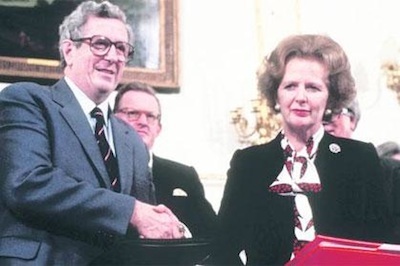
Over 500 files have been made available to historians in Belfast this week as part of the declassification of government files dating from the mid-1980s.
Some 150 files have been largely opened but with some material redacted (partially censored), while 108 files have been “fully closed” for a further 56 years (completely censored). The bulk of those files relate to prison matters or what the British government termed “civil disobedience” or security matters.
One key file opened in Belfast claimed Margaret Thatcher signed the Anglo-Irish Agreement in part because she wanted to go down in history as the person who solved both the problems of Ireland and Rhodesia (now Zimbabwe).
Robert Andrew, the most senior civil servant in the British government’s Northern Ireland Office (NIO), wrote in 1985 of Thatcher’s personal motivation in pressing ahead with the agreement.
In the memo, Andrew set out the background to the Anglo-Irish Agreement as it was just weeks away from being signed.
It provides a uniquely candid contemporaneous view of the reasons why Thatcher signed the agreement with Dublin which infuriated both unionists and republicans.
Andrew said that in 1983, the British government concluded that the IRA’s armed campaign and a deteriorating economic situation requiring heavy spending “could not be allowed to continue” and that a “major effort” should be made to resolve the problem. He added: “The Irish government under Dr FitzGerald (pictured, left) were worried about the alienation of the minority in the North and the rise of Sinn Fein and were ready to co-operate in seeking solutions.”
The detailed memo then turned to Mrs Thatcher’s close personal involvement in the process, and the influence of the previous 26 County Taoiseach, Charles Haughey.
“The Prime Minister is attracted by the idea of going down in history as the person who solved both the Rhodesian and the Irish problems (an idea suggested to her by Mr Haughey); but she does not want to be accused by the unionists (with whom her sympathies instinctively lie) of a sell-out to Dublin.”
He said British officials wanted an agreement “for its own sake” because a failure to reach agreement would cause serious problems in their relations with the USA “and lead to increased support for NORAID [the Irish Northern Aid Committee]”.
However, he noted that Thatcher did not want to be accused of a sell-out to Dublin by the unionists “with whom her sympathies instinctively lie”. Ultimately, Andrew, who had Thatcher’s support, said the 1985 deal had to be crafted to encourage nationalists to support British political institutions and the Crown forces but without alienating unionists or involving an “unworkable” degree of “interference” by Dublin in the North’s affairs.
Taoiseach Garret FitzGerald “had a genuine desire to make an historic contribution to resolving the Irish problem”, he said, but that unionist hostility would be significant.
However, he went on: “On the other hand, the consequences of not [underlined] having an agreement would be extremely serious.
“The main plank of our present policy would have collapsed and the collapse would be a body blow for [Sinn Fein’s nationalist rivals, the SDLP], who have placed all their faith in the Anglo-Irish talks.
“It would be a gift for Sinn Fein who would regard it as proof that political means produce nothing and that violence is the only answer.
“Unionists on the other hand would be triumphal and in no mood for concessions to the minority.”
Concluding that a deal had to be done, he said that “I believe we are now too far committed to draw back”.
WARNING OVER IRISH
But just after the agreement was signed, British officials found themselves quickly struggling with the new dispensation.
One note from the NIO claimed that using the Irish language in an official capacity in the Six Counties could lead to “rabid” behaviour.
The NIO warned against “sentimentalising” the value of Irish language and culture. One official complained: “The conventional pluralism of Northern Ireland public policy will be shattered and we shall end up with two rabidly British and rabidly Irish communities ... I see no reason to believe that there is any route to internal harmony which does not involve wider, indeed post-national identities.”
NIO officials said the views of the Dublin government on the issue were “reactionary”, meaning regressive.
“It is only the UK which is in a position to take a properly comprehensive view and it really cannot do so if we sentimentalise about the value of Irish language and culture.
“The reality - and a very good thing too - is that Ireland and Britain are both sharers in mid-Atlantic society.
“It is always possible for the Robin Flowers (an English poet who translated poetry from Irish) of this world to love romantic Ireland dead and gone. But it would be disastrous if that spirit played any part in UK public policy-making.”
‘FOREIGN LANGUAGE’
The files also contain a complaint by the prominent human rights campaigner and prison chaplain Monsignor Raymond Murray that he had been ordered to stop using Irish during a pastoral visit to Long Kesh Prison in 1985.
On November 22 1985 - just a week after the signing of the Anglo-Irish Agreement - the then Fr Murray complained to the then British Direct Ruler Tom King about the incident.
When Fr Murray protested that he regarded the ban on Irish “as an infringement of freedom of conscience and cultural rights”, he was informed that the prison governor had instructed that his visit “must not be conducted in a foreign language”.
The priest asked King to confirm whether visits in Irish were permissible and, if so, to make this clear to the staff. “Otherwise”, he added, “it leaves the situation open to accusations of pure bigotry against Catholics.” The files do not record any direct response on the issue.
![[Irish Republican News]](https://republican-news.org/graphics/title_gifs/rn.gif)
![[Irish Republican News]](https://republican-news.org/graphics/title_gifs/harp.gif)

